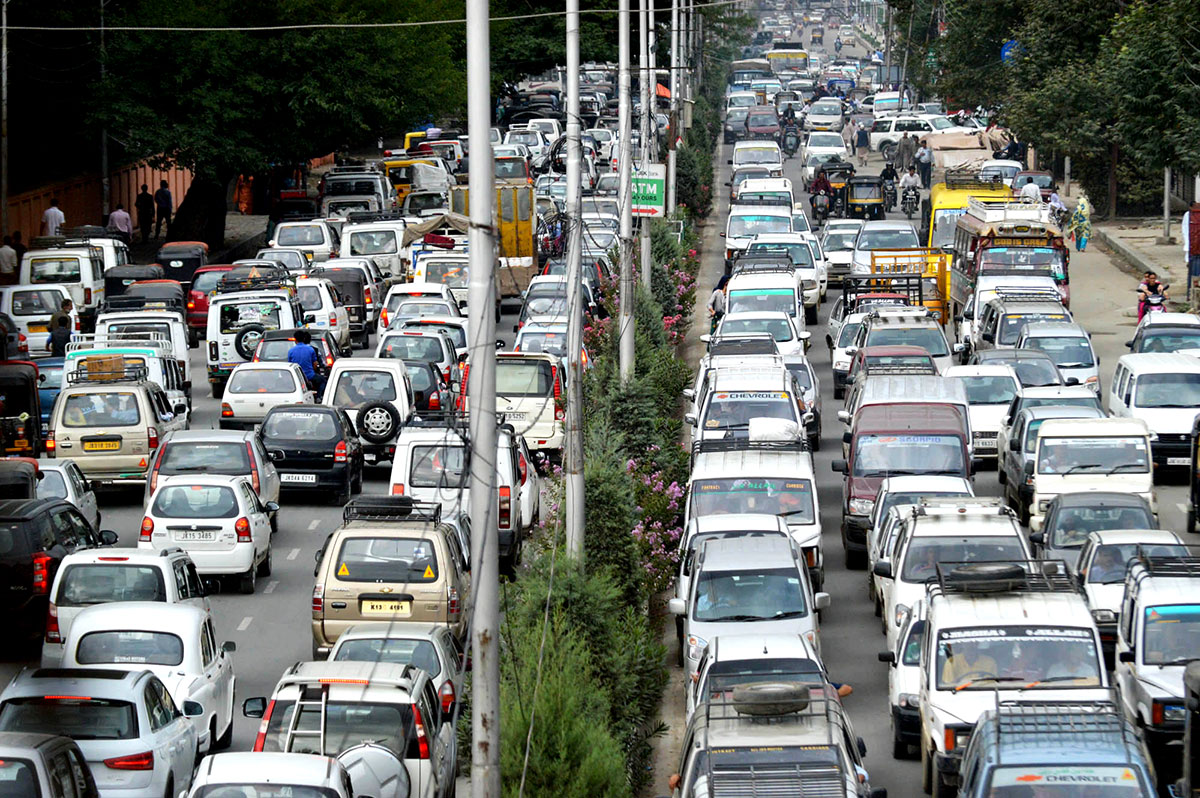by Muhammad Nadeem
Public transportation, the lifeblood of any thriving society, connects individuals to their workplaces, schools, healthcare sanctuaries, and beyond. In its ideal manifestation, this mode of conveyance embodies efficiency, affordability, and, its paramountcy – safety, thus rendering economic and social opportunities accessible to all.

Regrettably, the public transportation system of Kashmir has, in stark contrast, unfurled a dystopian chronicle. Instead of being the benevolent servant of the masses, it has transformed into an unwieldy burden, a perilous menace, and the wellspring of ceaseless desolation.
A Brazen Disdain
At the very heart of the transport quagmire lies the reprehensible, cavalier demeanour of countless drivers. These wayfarers exhibit a brazen disdain for punctuality, safety norms, and, most grievously, the rudiments of customer service. Buses careen recklessly down the labyrinthine roads, their bellies bulging with passengers precariously dangling from open doors. Forget designated halts; these drivers halt at whims, oblivious to the traffic chaos they sow. Aggressive acceleration, abrupt halts, and daredevil turns have metamorphosed these vehicles into instruments of calamity, contributing significantly to the spiralling tally of accidents and fatalities.
Beyond the perils of the road, passengers are subjected to a repertoire of torment. Overcharging is the norm, change becomes an elusive unicorn, expletives rain down like a deluge, and music blares relentlessly. Women and students, in particular, find themselves ensnared in a web of physical harassment and bullying. Law enforcement agencies appear unwilling to rein this alarming criminal misconduct. Until these drivers forsake their predatory inclinations and embrace a modicum of respect for the dignity of their passengers, the promise of public transit remains unrealized.
Nightmarish Travels
Venture onto a bus, and you are thrust into a nightmarish tableau of overcrowding. Passengers are packed so tightly that movement and even breathing are luxuries. In this suffocating human sardine can, unwanted physical contact, harassment, and petty theft are rife. Emergencies, like sudden braking or collisions, become spectres of dread as passengers collide helplessly. The overcrowding also serves as an incubator for diseases, an affront to the very concept of a civilised society.
The concept of a schedule is treated with disdain, as buses meander along routes in whimsical disregard for time. The result? Commuters languish endlessly at bus stops, watching as a cavalcade of overcrowded buses bound for distant destinations passes by. Uncertainty shrouds their daily grind, for they cannot predict when their lifeline might appear. No regard for passengers’ time engenders a frantic race as commuters scramble to board infrequent buses. With no respect for time, mirroring the ebb and flow of demand, public transportation falters in its quest to serve as the lifeblood of economic and social activity.
9-5 Facility
As the sun bids adieu and darkness cloaks the land, public transportation in Kashmir follows suit, grinding to a halt. This nocturnal exile marginalises entire segments of society. Shift workers, the unsung heroes of society – nurses, guards, factory labourers, and cleaners – find themselves stranded without a lifeline home. The absence of night buses perpetuates the exclusion of women from public spaces after dusk.
Students forfeit access to evening tuition and library facilities, and the vibrancy of social, cultural, and economic activities withers in the shadows. A functional society cannot tolerate public transit that caters solely to the nine-to-five crowd; the clamour for 24/7 bus service grows increasingly urgent.
Public Transporter
Beneath the veneer of these public transit debacles lies a tale of woeful underinvestment and administrative ineptitude on the part of the Jammu and Kashmir government. The State Road Transport Corporation’s fleet, though efficient in most cases, but meagre in size and dilapidated in condition, fails to meet the burgeoning demands of the populace. Private operators, filling the void, deploy ageing, overburdened, and poorly maintained minibuses.
The absence of a coherent vision for fleet expansion and modernisation exacerbates the crisis. Bus stops remain starkly devoid of basic amenities such as seating, schedules, and shelters. The realm of traffic enforcement appears as an eerie wasteland, bereft of regulation and foresight. Without the advent of a reliable, comfortable public transit system, the masses will be loath to part with their private vehicles.
The Smart City
Enter the Smart City mission, heralding a glimmer of hope on the horizon of Srinagar’s beleaguered public transit landscape. One hundred electric buses, cloaked in zero-emission virtue, equipped with surveillance cameras and passenger-request stop buttons, have been dispatched for trial runs. The promise? Alleviating overcrowding, extending nocturnal services, and ushering in an era of modernized efficiency.
This trial phase, a crucible of route optimisation, driver training, and onboard IT system evaluation, heralds the dawn of a new era in public mobility. With amenities like air conditioning and door controls for drivers, this pristine fleet aspires to redefine the essence of public transit – sustainable, passenger-centric and adeptly managed. The electric bus metamorphosis stands as a potent symbol of the investment and reform imperative looming large over Kashmir’s ailing public transportation.
Government Must Act
The onus rests squarely on the government, necessitating a monumental budgetary commitment to public transit as an indispensable social infrastructure, the linchpin of economic advancement and improved living standards. In tandem, riders and civil society collectives must press the authorities relentlessly, demanding these transformative reforms. The spectre of dysfunctional public transport holds Kashmir’s societal progress hostage, its development stymied. Only through sweeping reforms, underpinned by a resolute commitment to the public interest, can public transit become a catalyst for progress.
The post Tardy Transit appeared first on Kashmir Life.
from Kashmir Life https://ift.tt/47rEVvq
via IFTTThttps://ift.tt/ugJr6CH
No comments:
Post a Comment